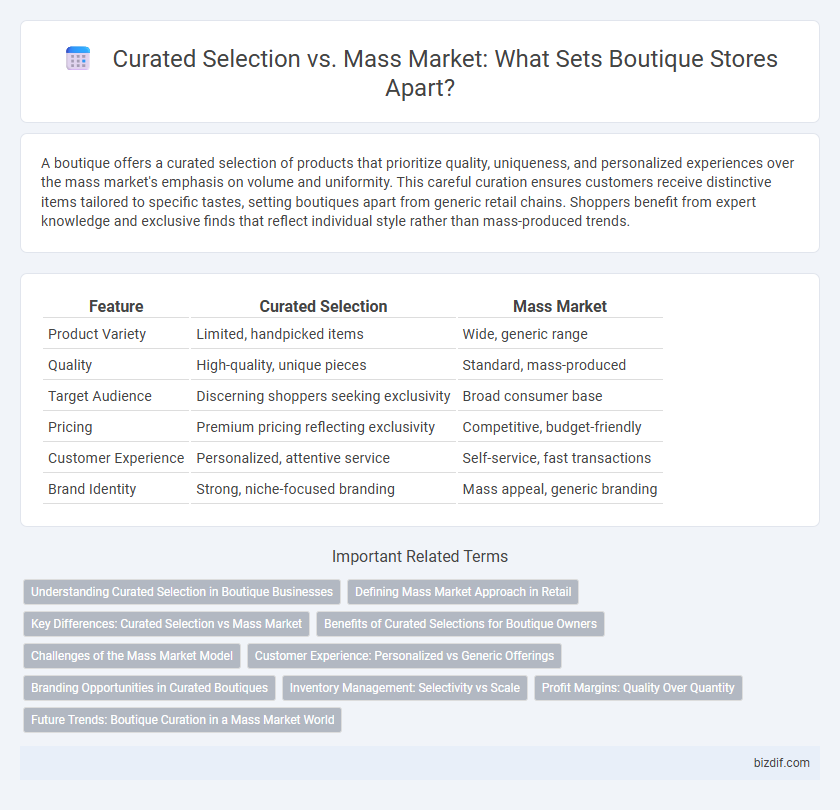A boutique offers a curated selection of products that prioritize quality, uniqueness, and personalized experiences over the mass market's emphasis on volume and uniformity. This careful curation ensures customers receive distinctive items tailored to specific tastes, setting boutiques apart from generic retail chains. Shoppers benefit from expert knowledge and exclusive finds that reflect individual style rather than mass-produced trends.
Table of Comparison
| Feature | Curated Selection | Mass Market |
|---|---|---|
| Product Variety | Limited, handpicked items | Wide, generic range |
| Quality | High-quality, unique pieces | Standard, mass-produced |
| Target Audience | Discerning shoppers seeking exclusivity | Broad consumer base |
| Pricing | Premium pricing reflecting exclusivity | Competitive, budget-friendly |
| Customer Experience | Personalized, attentive service | Self-service, fast transactions |
| Brand Identity | Strong, niche-focused branding | Mass appeal, generic branding |
Understanding Curated Selection in Boutique Businesses
Curated selection in boutique businesses emphasizes carefully chosen, high-quality products tailored to niche customer preferences, differentiating them from mass market stores that prioritize broad inventory and volume sales. This approach enhances customer experience by offering unique, exclusive items that align with specific tastes and trends, fostering brand loyalty and perceived value. Boutique retailers leverage curated selections to create personalized shopping environments that mass market competitors often cannot replicate.
Defining Mass Market Approach in Retail
The mass market approach in retail targets a broad audience by offering standardized products designed to appeal to a wide range of consumers, prioritizing high volume sales and competitive pricing. This strategy relies on extensive distribution channels and mass advertising to maximize market penetration. Unlike boutique stores that emphasize exclusivity and unique items, mass market retailers focus on scalability and accessibility.
Key Differences: Curated Selection vs Mass Market
Boutiques specialize in curated selections, offering unique, handpicked products that emphasize quality, exclusivity, and personalized customer experiences. Mass market retailers focus on high-volume sales with standardized, widely available goods aimed at broad consumer bases and competitive pricing. The key difference lies in product diversity and shopping experience: boutiques prioritize distinctiveness and tailor-made appeal, while mass markets emphasize variety and affordability.
Benefits of Curated Selections for Boutique Owners
Curated selections allow boutique owners to offer unique, high-quality products that differentiate their store from mass-market retailers, enhancing brand identity and attracting discerning customers. Focusing on limited, carefully chosen items enables better inventory management, reducing overstock and increasing turnover rates. This approach also fosters stronger customer loyalty by providing personalized shopping experiences tailored to niche markets.
Challenges of the Mass Market Model
The mass market model faces challenges such as lack of personalization and difficulty in meeting diverse consumer preferences, leading to diminished customer loyalty and engagement. Inventory management becomes complex due to the need for large-scale production and distribution, often resulting in excess stock or shortages. Furthermore, mass market retailers struggle to maintain quality control and distinctive brand identity amid intense competition and price-driven consumer behavior.
Customer Experience: Personalized vs Generic Offerings
Boutique stores emphasize a curated selection of products tailored to individual tastes, enhancing customer experience through personalized offerings. Unlike mass market retailers that provide generic inventory aimed at broad audiences, boutiques create a unique shopping environment with exclusive, high-quality items. This personalized engagement fosters stronger customer loyalty and satisfaction.
Branding Opportunities in Curated Boutiques
Curated boutiques offer unique branding opportunities by focusing on exclusive, carefully selected products that cater to niche markets, enhancing brand identity and customer loyalty. Unlike mass market retailers that emphasize volume and broad appeal, curated boutiques create personalized shopping experiences that reinforce brand values and storytelling. This targeted approach elevates perceived value, differentiates the brand, and fosters deeper emotional connections with discerning customers.
Inventory Management: Selectivity vs Scale
Boutiques prioritize curated selection over mass market by managing inventory with a focus on selectivity, sourcing unique, limited-quantity products tailored to niche customer preferences. Inventory management in boutiques emphasizes quality and exclusivity, reducing excess stock and minimizing markdowns, unlike mass market models that rely on extensive scale and volume to drive sales. This targeted approach ensures higher inventory turnover rates and strengthens brand identity through carefully chosen merchandise.
Profit Margins: Quality Over Quantity
Boutique stores prioritize a curated selection of high-quality products, enabling higher profit margins through exclusivity and craftsmanship. Mass market retailers focus on large-volume sales with lower margins, often sacrificing product uniqueness and quality. Emphasizing quality over quantity allows boutiques to attract discerning customers willing to pay premium prices, enhancing overall profitability.
Future Trends: Boutique Curation in a Mass Market World
Boutique curation thrives by offering exclusive, high-quality products that cater to niche markets, contrasting sharply with the uniformity of mass market goods. Future trends indicate increasing consumer demand for personalized, authentic experiences, driving boutiques to leverage advanced data analytics and AI for hyper-targeted selections. Sustainability and ethical sourcing also play critical roles in boutique curation, aligning with growing global awareness and shaping the competitive advantage over mass-produced alternatives.
Curated Selection vs Mass Market Infographic

 bizdif.com
bizdif.com